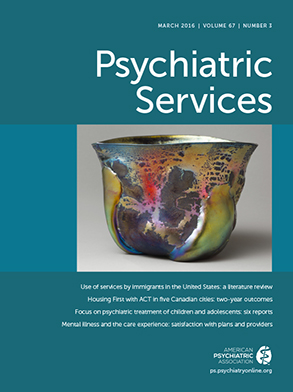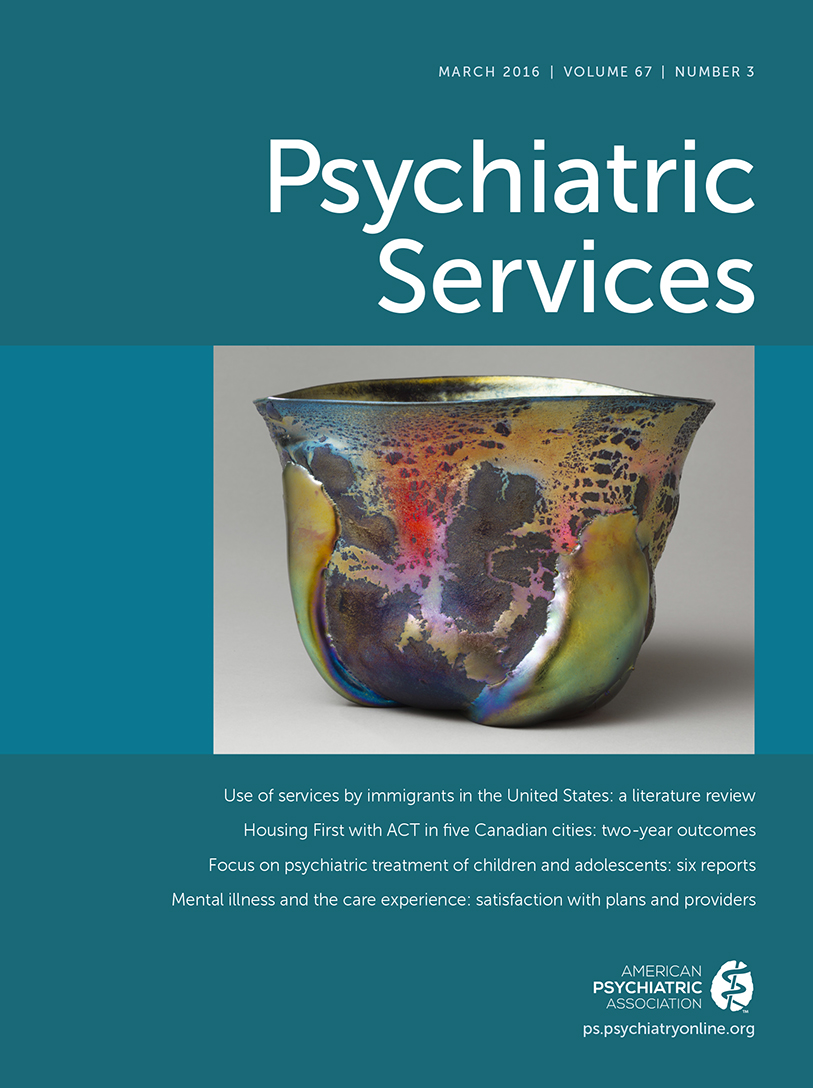The time of transition from hospital to community services is critical for individuals with serious mental illness. Among patients with schizophrenia, as many as 40% did not attend any outpatient visits in the 30 days after discharge (
1). Problems in continuity of care are associated with poorer outcomes and higher health care costs (
2). The American Association of Community Psychiatrists (AACP) developed 13 principles for managing transitions from one level of care to another in behavioral health systems. These guidelines represent a standard that is rarely met in practice because of limited resources (
3).
In Bexar County, Texas, a severe shortage of mental health providers and reduced availability of services for the most seriously ill patients combined to overwhelm health care systems and led to a dramatic increase in the use of emergency services and hospitalizations (
4,
5). With funding from the Methodist Health Ministries and the 1115 Medicaid Waiver Program, the Department of Psychiatry at the University of Texas Health Science Center at San Antonio developed the Transitional Care Clinic (TCC) to address these needs.
The TCC gives patients rapid access to behavioral health services on hospital discharge, provides gap services for up to 90 days, and effectively links individuals with community services for longer-term care (
3–
5). Since opening in April 2012, the TCC has served more than 2,700 patients with serious mental illness—a third with schizophrenia spectrum disorders, a third with mood disorders, and a third with anxiety disorders. The program differs from the brief critical time intervention in that although patients are initially met in the hospital, services are not provided until after discharge (
6). The TCC also functions as a specialty training program in community psychiatry for residents and interns from medicine, nursing, social work, counseling, and psychology. The TCC demonstrates practical application of the AACP guidelines for transitions.
Engagement During Hospitalization
Our information technology department developed a HIPAA-compliant, Web-based referral system called MONARCH that allows hospital staff to schedule TCC intake appointments for as soon as the day after discharge. Typically, there are 16 open slots per day, and half the scheduled patients keep their appointment. Hospital staff are required to upload treatment summaries to MONARCH before a patient’s appointment. MONARCH allows the hospital to know which patients keep intake appointments.
To engage patients, a TCC outreach coordinator meets with patients and families at referring hospitals before discharge to describe available services, gives each person a reminder call before the scheduled TCC intake to address barriers to attendance, and calls again to reschedule if the appointment is missed.
Group Intake and Other TCC Processes
Patients participate in a unique group intake process called the Access Group while family members and caregivers participate in a separate family psychoeducation group. The Access Group is run by a psychologist, a social work student, and a resident or medical student. The leader speaks with each patient in turn for about five to ten minutes while other patients watch. The person is invited to share the circumstances leading to his or her recent hospitalization, current difficulties, and treatment preferences. The staff member leading the family group gathers additional information to inform the Access team. The group process allows appointments for TCC services to be prioritized on the basis of clients’ needs. For example, some have run out of medication and need a prescriber appointment as soon as possible, and others have no money to fill a prescription and need to see a social worker. Acutely agitated patients or those who decline to participate are seen individually. In our experience, less than 1% of clients need to be seen individually.
After participants have been helped to formulate a plan, the group leader invites them into the waiting room and works with the Access team, which comprises Access Group leaders, the family group leader, and front-desk staff, to set appointments for all. The Access Group ends with an individual checkout (five to ten minutes) to go over each patient’s person directed plan (PDP). The PDP includes appointments and a preliminary transition plan from the TCC to the next level of care. [A sample PDP is included in an online supplement to this column.]
The Access Group process has several advantages over traditional one-on-one intakes. Most groups have at least one patient attending. Thus the group maximizes staff time. It is an excellent training platform for learners from all disciplines. The group benefits clients by providing support and normalization. The simultaneous family group sends the message that family involvement is important in recovery. The Access Group model prevents appointments from filling up and obviates the need to overbook appointments or to schedule appointments further out from discharge.
After Access, same-day appointments for medication management, social work, or counseling are given to those in most urgent need. More stable individuals are scheduled for visits within days or weeks on the basis of need. Family members are invited to an ongoing group.
Satisfaction with the Access process, assessed in anonymous surveys, has been good or excellent (mean±SD=4.3±.9 on a scale of 1 to 5, with 5 being highest; N=107). Patients in focus groups have noted that while the Access Group can be uncomfortable, it makes them feel less alone with their problems. Patients who felt uncomfortable stated that they preferred group intake if it meant less waiting time for services.
The TCC also offers cognitive adaptation training (CAT) (
7). CAT is an evidence-based home-delivered treatment that uses environmental supports, such as pill containers, alarms, and checklists, to bypass impairments in cognitive function and improve community adjustment. CAT therapists help the individual establish daily routines, follow through on medication and appointments, and pursue recovery goals. Research on CAT has shown the greatest changes in outcomes in the first three months. Patients are transitioned to CAT services provided by the local community mental health center (CMHC) where available.
Finally, the TCC offers a shared decision-making (SDM) intervention funded by a Patient-Centered Outcomes Research Institute grant to help patients become better consumers of mental health services. An SDM coach elicits the patient’s perspective, discusses options, focuses on personal goals, and teaches an easy-to-remember acronym for getting the most out of a visit— TAC-Review: tell (the doctor important information), ask (questions about treatment), choose (the treatment you think is best,) and review/research (note changes/get more information). The coach meets individually with patients before their TCC medication appointment. An SDM resource center provides decision tools, videos, and information about treatment.
Transitions to Longer-Term Community Treatment
When a person transitions out of the TCC, staff communicate directly with the receiving agency. Planning begins on day 1 but takes up to 90 days, depending on the availability of community services. TCC staff provide education to patients and families about the transition process, discuss the planned date, and help them deal with practical barriers. Supports are mobilized to help patients keep appointments (for example, CAT therapists accompany patients to the CMHC appointment to ensure a warm handoff.)
The TCC prioritizes transition by identifying a preliminary transition out of the TCC on the day of the Access Group (AACP guideline 1). The TCC provides an array of services (guideline 2). [TCC services are described in more detail in a table in the online supplement.] Integration of care (guideline 3) is fostered by an outreach coordinator and simplified with a Web-based system that allows hospital staff to schedule appointments, collateral data to be uploaded, and information regarding attendance to be transmitted back to the hospital. Patients are not discharged from the TCC to longer-term care until they see a prescriber at that agency. These measures ensure continuity of the treatment plan from the hospital to the TCC and from the TCC to the CMHC (guideline 4). Service users’ participation begins with a PDP and includes access to an SDM coach (guideline 5). Support system involvement (guideline 6) is encouraged by providing family groups. Respect for service users’ choices (guideline 7) is promoted by providing education in SDM for all treatment staff. The TCC promotes cultural sensitivity (guideline 8) by providing bilingual staff (Spanish-English) and multicultural staff trained in cultural competence. Interpreters are available.
Prevention (AACP guideline 9) is addressed by training all staff, patients, and family members about early signs of relapse. Access to resources (guideline 10) is addressed by care coordinators, who help clients connect with agencies for insurance, housing, and other services. Resource lists (for example, instructions on finding the lowest-cost medications) are updated regularly. Gradual transition from the TCC to longer-term care (guideline 11) is addressed by focusing on transition early and throughout a person’s tenure at the TCC. Because it is ideal to share responsibility for a patient during the initial transition between inpatient and outpatient services (guideline 12), the TCC outreach coordinator visits the hospital multiple times per week to engage patients once discharged. To ensure accountability (guideline 13), the TCC uses MONARCH and an electronic medical record to track show rates, rehospitalizations, and symptoms. The TCC’s funding is tied to meeting milestones in these areas. The breadth of the university system allows us to work with a variety of special populations (guideline 14), such as patients with first-episode psychosis and those with co-occurring disorders (mental and substance use disorders).
The TCC is able to address AACP guidelines largely because of outcomes-based funding from multiple sources. Funding tied to outcomes allows treatment to flexibly meet the needs of people with serious mental illness. Strategies for sustainability include back-billing, when allowed, after a patient obtains insurance and employment of a benefits coordinator.
Conclusions
Transitional care is important in reducing the risk of recidivism and improving outcomes. Creative approaches to information technology, funding, and staffing can help agencies incorporate guidelines for transitional care into practice.
Acknowledgments
This work was partly supported by a Patient-Centered Outcomes Research Institute (PCORI) Pilot Project Program Award (IH-1304-6506) and by the Methodist Healthcare Ministries and the Texas Health and Human Services Commission Delivery System Reform Incentive Payment 1115 Waiver Program.

